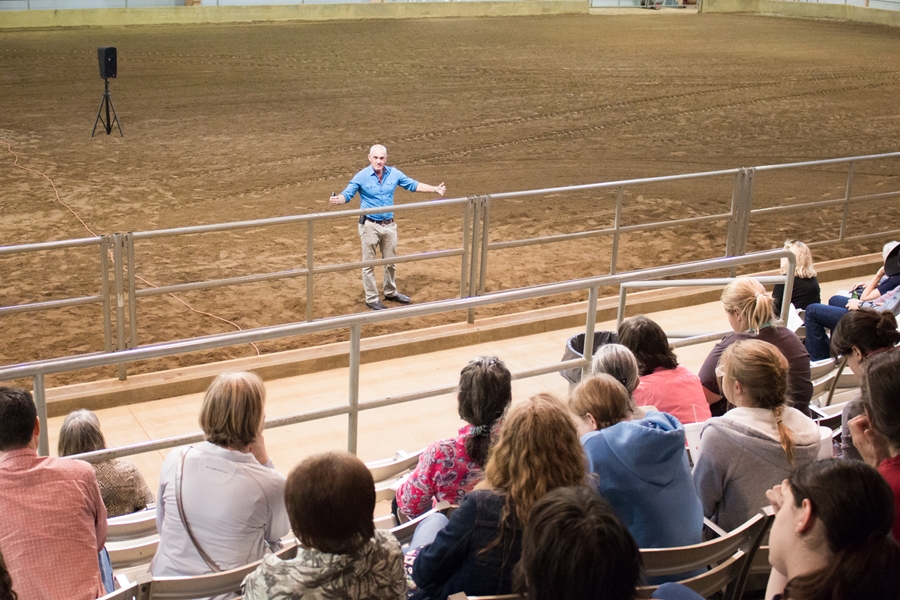
FAYETTEVILLE, Ark. – Andrew McLean, the developer and manager of the Australian Equine Behaviour Center, was on the University of Arkansas campus recently to visit with students and others as the Animal Science King Visiting Scholar for 2016.
McLean, an equine behavior expert, was a guest of the Department of Animal Science in the Dale Bumpers College of Agricultural, Food and Life Sciences. He presented two lecturers, one to students, faculty and staff in Hembree Auditorium during the day and an evening lecture for the public at the Pauline Whitaker Animal Science Center.
Both messages included information on training horses and elephants, learning theory, animal welfare and improving interactions with animals. The two events drew a combined attendance of almost 300. McLean signed books and visited with guests at a meet and greet session prior to the evening presentation.
"Learning theory is my reason for being, to explore where learning theory dovetails into ethology," said McLean.
Ethology is the science of animal behavior. Learning theory explores how information is absorbed, processed and retained.
"Learning allows animals to use information about the world to tailor their responses to environmental change," said McLean. "Training draws out desirable and suppresses undesirable innate behaviors to institute novel responses."
Human memory is reinforced by previous experiences, but for horses, memories are stored, he said.
"We have to be careful about expectations," McLean said. "Horses live in moments in time and have a great memory, but their recall of it is poor."
Challenges for horses are unnatural situations, such as confinement, isolation, grazing and training confusion.
"For horses, just to see and touch other horses is important," McLean said. "And grazing allows them to keep eating and moving."
As for training confusion, he pointed out that horses do not reason.
"It's about loss of predictability and controllability," said McLean. "That's the origin of where animals start to shrink into themselves. That is a major area of welfare concern."
McLean has won the Eureka Prize, the highest Australian science award; lectured at the University of Tasmania for 11 years on subjects ranging from animal behavior to genetics to Tasmanian fauna; and show-jumped at the Grand Prix level, held a racehorse owner-trainer's license and raced bareback in Australia and New Zealand.
He founded The HELP Foundation, a non-profit focused on the welfare and training of working elephants in Asia. McLean began training elephants in Nepal in 2007, which led to the creation of HELP, Human Elephant Learning Programs. The program includes the development and implementation of innovative training techniques based on learning theory and the elimination of punishment.
The King Visiting Scholar program is supported by the Carl B. and Florence E. King Foundation. It was created to contribute academically to the Bumpers College by giving students and others access to national and/or international authorities in their field. The Kings had a long-standing and dedicated interest in improving Arkansas' beef production industry.
About the Dale Bumpers College of Agricultural, Food and Life Sciences: Bumpers College provides life-changing opportunities to position and prepare graduates who will be leaders in the businesses associated with foods, family, the environment, agriculture, sustainability and human quality of life; and who will be first-choice candidates of employers looking for leaders, innovators, policy makers and entrepreneurs. The college is named for Dale Bumpers, former Arkansas governor and longtime U.S. senator who made the state prominent in national and international agriculture.
About the University of Arkansas: The University of Arkansas provides an internationally competitive education for undergraduate and graduate students in more than 200 academic programs. The university contributes new knowledge, economic development, basic and applied research, and creative activity while also providing service to academic and professional disciplines. The Carnegie Foundation classifies the University of Arkansas among only 2 percent of universities in America that have the highest level of research activity. U.S. News & World Report ranks the University of Arkansas among its top American public research universities. Founded in 1871, the University of Arkansas comprises 10 colleges and schools and maintains a low student-to-faculty ratio that promotes personal attention and close mentoring.
Topics
Contacts
Robby Edwards, director of communications
Dale Bumpers College of Agricultural, Food and Life Sciences
479-575-4625, robbye@uark.edu